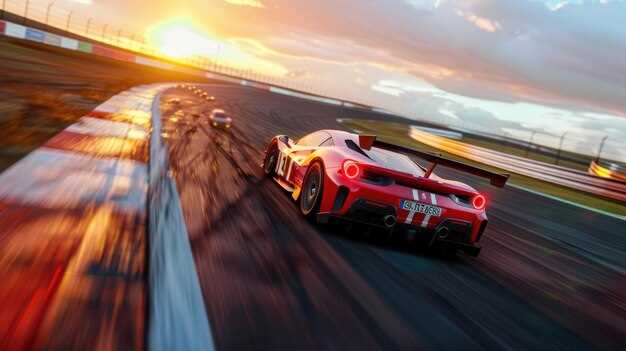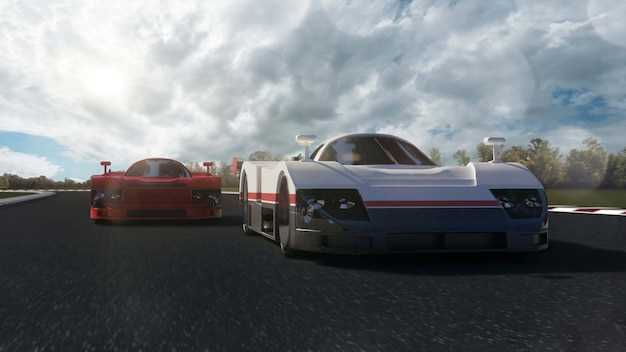
The world of GT racing offers an exhilarating experience for both fans and participants alike. As a niche within the broader motorsport industry, GT racing features high-performance sports cars competing on various circuits around the world. This category has gained immense popularity due to its combination of speed, strategy, and team collaboration. While there are numerous series dedicated to GT racing, a few stand out as the best in the industry.
Different regions host GT racing series, each with its unique characteristics and formats. From endurance races that challenge both driver and machine to sprint races emphasizing sheer speed and precision, the diversity of events captivates enthusiasts. Additionally, these series often attract some of the most prestigious automotive brands, making them a crucial part of the global motorsport calendar.
In this article, we will explore the top GT racing series across the globe, highlighting their unique features, race formats, and what makes them indispensable in the world of motorsport. Whether you’re a seasoned fan or new to the scene, understanding these premier series will enhance your appreciation for the spectacular world of GT racing.
Analyzing the Most Prestigious GT Racing Championships
The world of motorsport is marked by a variety of racing series, with GT (Gran Turismo) racing evolving as one of the most celebrated formats. This genre encapsulates a blend of endurance, speed, and automotive innovation, captivating fans globally. Let’s delve into some of the most prestigious GT racing championships that define this thrilling discipline.
One of the leading series is the FIA GT World Challenge, which showcases top-tier teams and drivers in a competitive environment. This series encompasses multiple formats, including sprint and endurance races, allowing teams to display their prowess while driving performance-oriented GT cars. The championship’s global presence, featuring events across Europe, Asia, and North America, highlights its significance in the GT racing landscape.
The IMSA WeatherTech SportsCar Championship is another heavyweight in the GT racing arena. This series is renowned for its diverse range of cars, combining GT Le Mans and GT Daytona classes. The endurance races, such as the iconic 24 Hours of Daytona, challenge drivers to maintain peak performance over extended periods, emphasizing strategic teamwork and resilience in motorsport.
In Europe, the British GT Championship stands out, providing a platform for both amateur and professional drivers. With its well-structured formats, this series encourages participation from a wide range of competitors while maintaining high standards of racing. The championship’s diverse calendar, featuring renowned circuits, attracts talent and fans alike, solidifying its reputation.
Lastly, the Asian Le Mans Series represents the rapid growth of GT racing in Asia. It offers teams the opportunity to compete at a high level, fostering regional talent and expanding the series’ influence. The blend of endurance and sprint races ensures a dynamic atmosphere, reflecting the evolving nature of GT competition.
Overall, these championships not only enhance the profile of GT racing but also contribute to the continuous development of technology and skills in motorsport. Their prestige is a testament to their legacy and the passion that fuels competitors and fans alike.
Key Features of Successful GT Racing Events

Successful GT racing events are characterized by a variety of crucial elements that enhance the overall experience for teams, drivers, and fans alike. One of the primary features is a well-structured championship format, allowing for a balanced competition throughout the series. Consistency in regulations and governance is vital to maintain fairness, enabling all participants to compete on equal footing while promoting perceived integrity in the sport.
Another essential aspect is the presence of top-tier automotive manufacturers and teams. Their involvement not only raises the profile of the event but also showcases cutting-edge technology and engineering excellence. This contributes to the development of the GT series, attracting more competitors and increasing the overall level of competition.
Fan engagement plays a significant role in the success of GT racing events. From interactive experiences at the race venues to comprehensive digital coverage, enhancing the spectator experience is key. Live streaming, social media updates, and behind-the-scenes content allow fans to connect with their favorite drivers and teams, fostering a community around the motorsport.
The variety of race formats and locations also contributes to the appeal of GT racing. Events that include sprint races, endurance challenges, and diverse track layouts attract a wider audience and provide different strategic elements for teams to navigate. Moreover, hosting races in iconic venues or picturesque settings enhances the allure, increasing attendance and media coverage.
Finally, the promotion of safety standards and technological advancements in vehicles is paramount. Successful GT racing events prioritize the well-being of drivers and crews, utilizing modern safety measures and innovations. This commitment to safety ensures that the sport remains competitive while fulfilling obligations to all stakeholders involved.
How to Get Involved in GT Racing: Opportunities and Pathways

Engaging in GT racing can be an exhilarating journey for motorsport enthusiasts. There are several pathways to enter this competitive world, each offering unique experiences and opportunities.
1. Karting as a Foundation: Starting with karting is a common approach for many aspiring racers. Karting provides essential skills such as vehicle control, racing lines, and competitive strategy. It is an accessible way to learn the basics of motorsport while developing a passion for racing.
2. Joining a Racing School: Attending a professional racing school can significantly enhance your skills and knowledge about GT racing. These institutions offer instruction on driving techniques, racecraft, and the intricacies of GT vehicles. Programs often include both classroom work and practical driving sessions on tracks.
3. Getting a Racing License: To compete in official GT racing events, obtaining a racing license is crucial. Each governing body, such as the FIA or local motorsport associations, has specific requirements and testing procedures. Completing these steps legitimizes your participation in competitive racing.
4. Working with a Team: Many drivers start their careers by getting involved with established racing teams. Roles can range from mechanics to data analysts, providing a practical understanding of GT racing dynamics. Networking within these teams can lead to driving opportunities in the future.
5. Participating in Amateur Events: Engaging in amateur competitions, including track days and club races, is an excellent way to gain hands-on experience. Many local motorsport clubs host events that welcome newcomers, focusing on building skills in a less pressured environment.
6. Seeking Sponsorship: As your skills develop, pursuing sponsorship can help finance your journey in GT racing. Companies often look for passionate racers to represent their brand, providing financial support in exchange for promotional opportunities.
7. Social Media and Online Communities: Engaging with motorsport communities online can open doors to finding mentors, advice, and chances to race. Platforms such as forums and social media pages dedicated to GT racing allow you to connect with experienced individuals in the field.
8. Virtual Racing as a Stepping Stone: Online racing simulators offer a cost-effective way to practice and refine your driving skills. Participating in virtual competitions can help you learn race strategies and build a competitive mindset without the immediate financial investment of real-world racing.
By actively exploring these pathways, aspiring racers can position themselves within the thrilling world of GT racing. Each step, whether through practice, education, or networking, contributes to the journey toward becoming a successful competitor in the sport.



